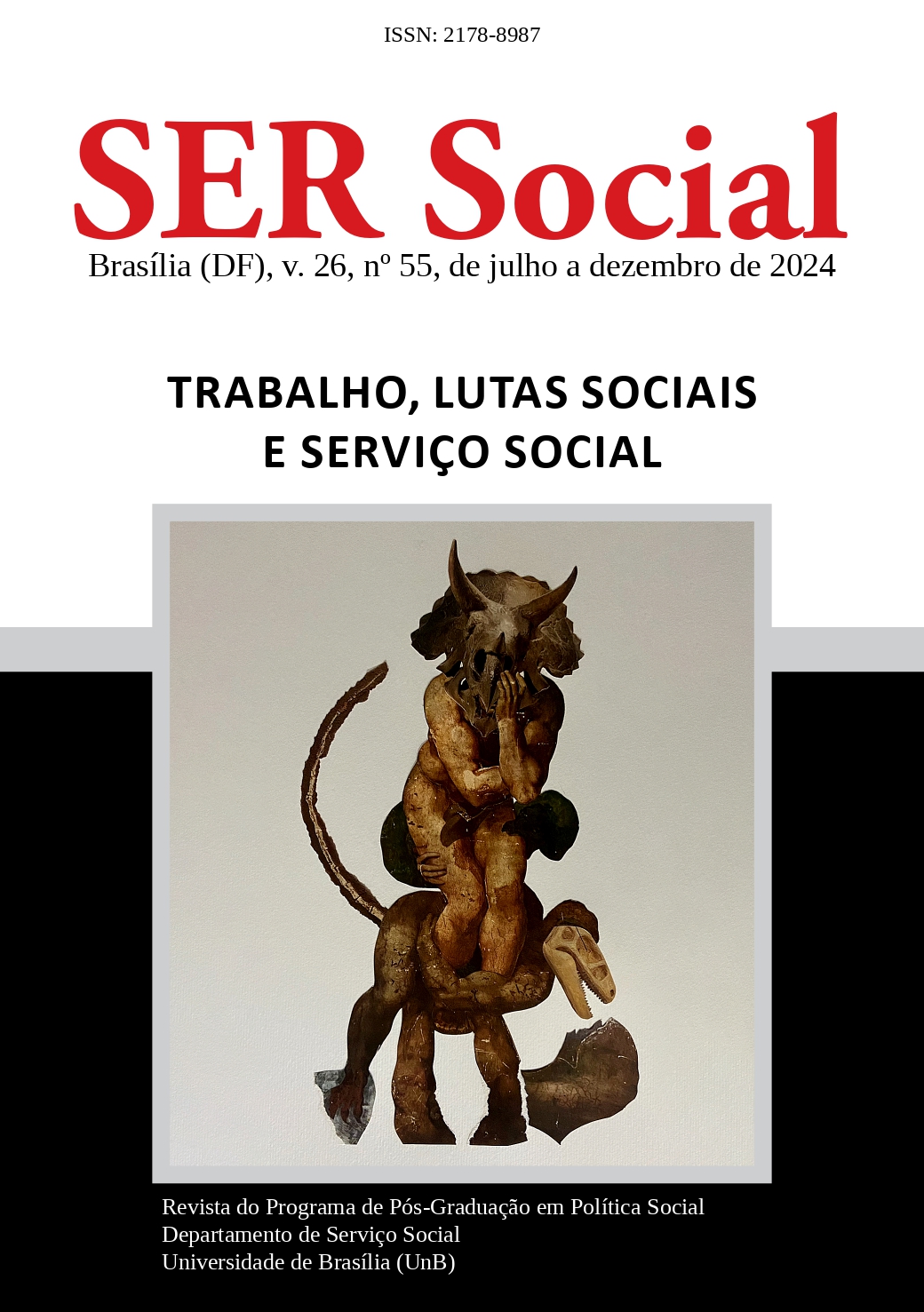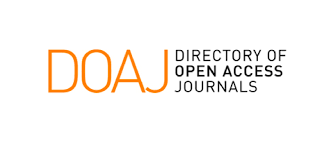Domestic workers, mobilizations and social media during the Covid-19 pandemic
DOI:
https://doi.org/10.26512/ser_social.v26i55.53945Keywords:
Trade union., Social movement., Domestic workers., Social media., Pandemic.Abstract
The Covid-19 pandemic in Brazil, as well as the social isolation policy that sought to reduce the effects of the health crisis, were not experienced in the same way
by workers. Domestic service was among the occupations most exposed to contamination risks. In this sense, the objective of the article is to analyze the
mobilizations through social media implemented or supported, in the year 2020, by the National Federation of Domestic Workers. This occurred in association with
classist, feminist and black social movements, such as the campaign “Take care of
those who care for you” and the “Manifesto of the daughters and sons of housemaids and housecleaners”. To this end, the research examines data on the impacts of the pandemic for this professional category and monitors the creation and effectiveness of these campaigns on digital platforms. Therefore, it becomes possible to articulate analyzes of collective actions, digital actions, social movements and labor movements.
References
ATZENI, M.; CINI, L. “New theories and politics for working class organizing in the
gig and precarious world of work”. Economic and Industrial Democracy, pp. 1-
, 2023.
BENNETT, W. L.; SEGERBERG, A. “The logic of connective action: digital media and
the personalization of contentious politics”. Information, communication &
society, v. 15, nº 5, pp. 739-768, 2012.
BERNARDINO-COSTA, J. “Decolonialidade e interseccionalidade emancipadora: a
organização política das trabalhadoras domésticas no Brasil”. Sociedade e Estado,
v. 30, nº 1, p. 147-163, jan./abr. 2015.
CAMPOS, A. “Sindicalismo no contexto de pandemia no Brasil: primeiras
impressões”. CESIT – IE/Unicamp. 2020a. Disponível em:
<https://www.cesit.net.br/sindicalismo-no-contexto-de-pandemia-no-brasilprimeiras-impressoes/>.
CAMPOS, A. “Trabalho de base em tempos de confinamento físico”. Fundação Perseu
Abramo, 2020b. Disponível em: <https://fpabramo.org.br/2020/03/23/trabalhode-base-em-tempos-de--confinamento-fisico/>.
CAMPOS, A. Sindicalismo na pandemia: em busca de legitimidade e protagonismo.
In: OLIVEIRA, D. A.; POCHMANN, M. A devastação do trabalho: a classe do
labor na crise da pandemia. Brasília: Gráfica e Editora Positiva: Confederação
Nacional dos Trabalhadores em Educação (CNTE) e Grupo de Estudos sobre Política
Educacional e Trabalho Docente, p. 55-82, 2020c.
CANT, C. Riding for Deliveroo: resistance in the New Economy. Cambridge:
Polity, 2020.
CARDOSO, A. M. A negociação coletiva em meio a uma pandemia. In: LOPES, A. F.
M; GIORGI, F. C.; CASTRO, M. S. P. de; MELLEIRO, W. P. (orgs.). Sindicato: entre
a permanência e a mudança. São Paulo: Fundação Friedrich Ebert/Instituto Lavoro,
CASTELLS, M. A transformação do mundo na sociedade em rede. In: Redes de
indignação e esperança: movimentos sociais na era da internet. Rio de Janeiro:
Zahar, 2017, p. 189-206.
COSTA, H.; CARNEIRO, B. “Digital communication as a global challenge for trade
unions: Lessons from Brazil and Portugal”. Tempo Social, v. 33, nº 2, p. 183-208,
DAVIS, A. Mulheres, raça e classe. São Paulo: Boitempo Editorial, 2016.
DENCIK, L.; WILKIN, P. Digital activism and the future of worker resistance. In:
MEIKLE, G. (ed.). The Routledge companion to media and activism. New
York: Routledge, 2018, pp. 125-133.
DIEESE. O trabalho doméstico 10 anos após a PEC das Domésticas. Estudos e
Pesquisas, nº 106, p. 1-25, abr. 2023. Disponível em:
<https://www.dieese.org.br/estudosepesquisas/2023/estPesq106trabDomestico.pdf
>.
DREW, J. The communicative core of working class organization. In: MEIKLE, G.
(ed.). The Routledge companion to media and activism. New York: Routledge,
, pp. 117-124.
FOMINAYA, C. F. Democracy reloaded: inside Spain’s political laboratory from
-M to Podemos. Oxford Studies in Culture and Politics. New York, NY, Oxford
University Press, 2020.
FRAMIL FILHO, R.; MELLO e SILVA, L. “Trabalho, sindicatos e proteção social na
pandemia de 2020: notas sobre o caso brasileiro”. Ciências Sociais, v. 56, nº 2, p.
-188, 2020.
GERBAUDO, P. Tweets and the Streets: Social Media and Contemporary
Activism. London: Pluto Press, 2012.
GRAHAM, S. L. Proteção e obediência: criadas e seus patrões no Rio de Janeiro,
-1910. São Paulo: Companhia das Letras, 1992.
GROHMANN, R.; MENDONÇA, M.; WOODCOCK, J. “Communication and Work
from Below: The Role of Communication in Organizing Delivery Platform Workers”.
International Journal of Communication, 17, pp. 3919-3937, 2023.
HIRATA, H. “Gênero, classe e raça: interseccionalidade e consubstancialidade das
relações sociais”. Tempo Social, v. 26, nº 1, p. 61-73, jun. 2014.
KAVADA, A. Connective or collective? The intersection between online crowds and
social movements in contemporary activism. In: MEIKLE, G. (ed.). The Routledge
companion to media and activism. New York: Routledge, 2018, pp. 108-116.
KHALIL, A.; STORIE, L. K. “Social media and connective action: the case of the Saudi
women’s movement for the right to drive”. New Media & Society, 23(10), pp.
-3061, 2020.
MATIAS, K. A.; ARAUJO, A. B. Configurações do trabalho doméstico remunerado na
pandemia e no pós-pandemia no Brasil: desigualdades e vulnerabilidades no cuidado
domiciliar. In: CAMARANO, A.; PINHEIRO, L. (orgs.). Cuidar, verbo transitivo:
caminhos para a provisão de cuidados no Brasil. Rio de Janeiro: Ipea, 2023, p. 289-
McADAM, Doug; TARROW, Sidney; TILLY, Charles. “Para mapear o confronto
político”. Lua Nova, São Paulo, nº 76, p. 11-48, 2009.
NOWAK, J.; SANTANA, M. “Social media and collective action in Brazil: the
experience of truck drivers and delivery workers”. Socialism and Democracy,
Taylor Francis On Line, 2023, pp. 1-21.
ORGANIZAÇÃO INTERNACIONAL DO TRABALHO. Mais trabalho decente
para trabalhadoras e trabalhadores domésticos no Brasil. Brasília, DF:
Escritório no Brasil, 2008. Disponível em:
<http://www.oitbrasil.org.br/sites/default/files/topic/discrimination/doc/trabalho_
domestico_40.pdf>.
ORGANIZAÇÃO INTERNACIONAL DO TRABALHO. Perfil do trabalho decente
no Brasil: um olhar sobre as Unidades da Federação durante a segunda metade da
década de 2000. Brasília, DF: Escritório da OIT no Brasil, 2012. Disponível em:
PESSANHA, E.; RODRIGUES, M. C. “No olho do furacão: a ação sindical possível em
tempos de Covid-19 – o caso Sinttel Rio”. Revista Dilemas. Rio de Janeiro: IFCSUFRJ, v. 1, p. 1-6, 2020.
PINHEIRO, L. et al. Os desafios do passado no trabalho doméstico do século XXI:
reflexões para o caso brasileiro a partir dos dados da PNAD Contínua. In:
PINHEIRO, L.; TOKARSKI, C.; POSTHUMA, A. (orgs.). Entre relações de
cuidado e vivências de vulnerabilidade: dilemas e desafios para o trabalho
doméstico e de cuidados remunerado no Brasil. Brasília: IPEA; OIT, 2021, p. 67-104.
PORFÍRIO, T. A cor das empregadas: a invisibilidade racial no debate do trabalho
doméstico remunerado. Belo Horizonte: Letramento, 2021.
ROSENFIELD, C.; PAULI, J. “Para além da dicotomia entre trabalho decente e
trabalho digno: reconhecimento e direitos humanos”. Caderno CRH, Salvador, v.
, nº 65, p. 319-329, maio/ago. 2012.
SANTANA, M. A. “Classe trabalhadora, precarização e revolta no Brasil da
pandemia”. Revista Em Pauta – Teoria social e contemporaneidade, nº 48,
v. 19, p. 70-91, 2021.
SOUZA, F. Criados, escravos e empregados: o serviço doméstico e seus
trabalhadores na cidade do Rio de Janeiro (1850-1920). Rio de Janeiro: Arquivo
Nacional, 2019.
TELLES, L. Libertas entre sobrados: mulheres negras e trabalho doméstico em
São Paulo (1880-1920). São Paulo: Alameda, 2013.
TRÓPIA, P. “Nem deuses nem heróis: a ação sindical dos trabalhadores da saúde
durante a pandemia de Covid-19”. Política & Sociedade. Dossiê Trabalhos
Essenciais na Pandemia, UFSC, v. 20, nº 48, p. 41-77, 2021.
TUFEKCI, Z. Twitter and Tear Gas. The power and fragility of networked protest.
New Haven: Yale University Press, 2017.
WOODCOCK, J. The fight against platform capitalism: An inquiry into the
global struggles of the gig economy. London: University of Westminster Press, 2021.
Downloads
Published
Issue
Section
License
Copyright (c) 2024 SER Social

This work is licensed under a Creative Commons Attribution-NonCommercial-NoDerivatives 4.0 International License.
 Todo o conteúdo deste periódico, exceto onde está identificado, está licenciado sob uma https://creativecommons.
Todo o conteúdo deste periódico, exceto onde está identificado, está licenciado sob uma https://creativecommons.
Copyright: Os autores serão responsáveis por obter o copyright do material incluído no artigo, quando necessário.
Excepcionalmente serão aceitos trabalhos já publicados (seja em versão impressa, seja virtual), desde que devidamente acompanhados da autorização escrita e assinada pelo autor e pelo Editor Chefe do veículo no qual o trabalho tenha sido originalmente publicado.








